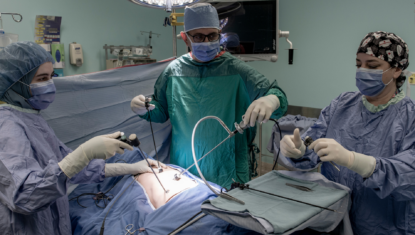Orthopaedic Surgery, Plastic Surgery, and other surgery-related research.
The Division of Pediatric Orthopaedic Surgery has published research papers in the peer-reviewed literature across the spectrum of pediatric orthopedics: from orthopedic trauma to global surgery, from basic biomechanical research to involvement in multi-center research projects on post-operative pain, education for health providers and health consumers.
Twitter: @CHEOOrthopedics
Related News
Research Projects
-
Virtual psychoeducation for improvement of pain catastrophizing in pediatric presurgical patients and caregivers: A proof-of-concept study
03/10/2024
Youth (n = 43) and caregivers (n = 41) attended a virtual, group-based single-session intervention (SSI). Single-session intervention content addressed pain neuroscience, PC, and adaptive coping strategies for managing pain and PC drawn from cognitive-behavioural, acceptance and commitment, and dialectical behaviour therapy approaches. Participants completed questionnaires assessing PC at preintervention, postintervention, and two weeks postsurgery. Youth mood and anxiety were assessed at preintervention.
-
Burosumab for the treatment of cutaneous-skeletal hypophosphatemia syndrome
11/11/2023
Cutaneous-skeletal hypophosphatemia syndrome (CSHS) is a rare bone disorder featuring skeletal and skin manifestations, caused by mosaic somatic activating RAS family pathogenic variants with mosaic effects (Lim et al., 2016). CSHS is characterized by the overproduction of fibroblast growth factor-23 (FGF23), which is secreted by osteocytes in affected dysplastic bones (Ovejero et al., 2023). FGF23 causes inhibition of renal absorption and gastrointestinal absorption of phosphate by lowering sodium phosphate cotransporter activity and limiting 1,25-dihydroxyvitamin D (1,25(OH)2D) synthesis (Lim et al., 2016). Together, these biochemical aberrations result in hypophosphatemia, causing bone pain, rickets, long bone deformity, as well as impaired growth and mobility (Ovejero et al., 2016; Lim et al., 2016). Conventional treatment of CSHS with phosphate supplementation and active vitamin D does not directly address the FGF23 over-expression (Lim et al., 2014). While phosphate supplementation brings about temporary increases in serum phosphorus levels, it also increases FGF23 production, which ultimately perpetuates the renal phosphate-wasting and fails to successfully treat rickets. Burosumab is a fully human monoclonal antibody, given subcutaneously every two weeks in children, that neutralizes FGF23. Burosumab was recently shown to be superior to conventional therapy in a phase 3 randomized controlled trial in children with X-linked hypophosphatemia (XLH), another childhood-onset condition linked to FGF23 overproduction (Imel et al., 2019).
-
Treatment and Outcomes of Congenital Ovarian Cysts A Study by the Canadian Consortium for Research in Pediatric Surgery (CanCORPS)
01/11/2023
The outcomes of interest were the incidence of cyst resolution, of interventional management, and of ovarian preservation. Cyst resolution was defined as either the complete sonographic disappearance of the previously identified ovarian cyst or a decrease in ovarian cyst size to < 10 mm. An intervention was defined as a procedure performed to remove the cyst or diminish its size. This included percutaneous aspiration, ovarian-sparing surgical procedures such as cyst unroofing or cystectomy, or oophorectomy. Ovarian preservation was defined as the presence of a viable ovary at the point of last follow-up after either operative or nonoperative management. Specifically, it was the sonographic identification of a viable ipsilateral ovary after observation, or the surgical documentation of a visibly viable residual ovary in a patient who underwent operative management.
-
Number of epilepsy surgeries has decreased despite an increase in pre-surgical evaluations at a tertiary pediatric epilepsy center in Ontario
12/04/2023
Despite an increasing trend in pre-surgical evaluation, there was a decreasing trend in the number of epilepsy surgery in the later period as there was a larger proportion of patients in whom the seizures could not be localized. Trends in presurgical evaluation and epilepsy surgery will continue to evolve with introduction of technologies such as stereo-EEG and minimally invasive laser therapy.
-
Criteria Used to Determine Unrestricted Return to Activity After ACL Reconstruction in Pediatric and Adolescent Patients: A Systematic Review
07/03/2023
Only 14 of the 27 reviewed studies reported using >1 criterion when determining RTA. Furthermore, few studies used patient-reported outcome measures or lower limb kinematics as RTA criteria, indicating that more research is needed to validate these metrics in the pediatric population.
-
From “ACAN” to “I CAN”: Restoring wellness in a boy with severe osteochondritis dissecans through diagnostic precision combined with optimal medical, surgical and rehabilitation management
18/02/2023
The optimal management of atypical osteochondritis dissecans with multi-joint involvement and other morphological atypia requires multidisciplinary care. The inclusion of comprehensive bone health and metabolism as well as genetic investigations provided important information to help guide treatment in this case.
-
The effect of vertebral body tethering on spine range of motion in adolescent idiopathic scoliosis: a pilot study.
17/09/2022
-
Development and validation of a Fast Spine Protocol for Use in Paediatric Patients
23/08/2022
This study demonstrates that selected spinal imaging sequences allows for consistent and accurate diagnosis of specific clinical conditions. A limited spine protocol reduces acquisition time, potentially avoiding sedation. Further work is needed to determine the utility of selected imaging for other clinical indications.
-
Management and Outcomes of Clinical Scaphoid Fractures in Children
17/05/2022
Management of clinical scaphoid fractures at our institution was relatively uniform: nearly all patients were immobilized and less than 20% received advanced imaging. Our findings suggest a low but non-zero occult scaphoid fracture rate, discordance in radiologic interpretation, and lack of advanced imaging, providing an avenue for future prospective studies.
-
Coronal deformity angular ratio as a predictive factor for in-brace curve correction and long-term outcome of brace treatment in adolescents with idiopathic scoliosis
01/05/2022
To investigate the relationship between coronal deformity angular ratio (C-DAR) and in-brace correction (IBC) and their role in predicting the long-term bracing outcome in adolescents with idiopathic scoliosis (AIS).
-
Histopathology and post-operative complications in pediatric ulcerative colitis
22/02/2022
Our study found that Paneth cell metaplasia in the rectum length may lead to decreased odds of post-operative complications following the J-pouch procedure, while the remaining histological parameters did not show evidence of predicting post-operative complications. This knowledge is clinically important and relevant for pathologists and gastroenterologists who may consider using the Geboes et al. score or PROTECT score to identify histopathological parameters that could predict the presence of post-operative complications. Consequently, they can communicate relevant findings to surgeons during post-operative treatment planning.
-
Multidisciplinary Practice Variations of Anti-Thrombotic Strategies for Free Tissue Transfers
23/06/2021
There are diverse practice variations in anti-thrombotic strategies for free tissue transfers and a difference in perceived risk factors for flap failure that may affect patient management.
-
Pediatric Acetabular Osteomyelitis Treated With Hip Arthroscopy
04/04/2021
This case demonstrates how hip arthroscopy can serve as an important surgical treatment modality for acetabular osteomyelitis with intraarticular extension in addition to septic arthritis of the hip.
-
The Feasibility of Magnetic Resonance Imaging Without General Anesthesia Using the “Bundle and Scan” Technique for Infants With Sensorineural Hearing Loss
01/01/2021
The purpose of this study is to determine the feasibility of magnetic resonance imaging (MRI) without general anesthesia (GA) for infants being evaluated for sensorineural hearing loss (SNHL) using the bundle and scan technique.
-
Hip Joint Preservation Surgery: What Every Orthopaedic Provider Needs to Know
01/01/2021
It is important for the orthopaedic surgeon to be up to date on how the hip preservation field has evolved and the steps to consider when a painful hip presents in clinic.
-
Electronic Consultation Systems: Impact on Pediatric Orthopaedic Care
11/09/2020
This cross-sectional study demonstrates the effective and timely use of eConsult in pediatric orthopaedic surgery. It also shows a significant reduction in the number of in-person consultations required and demonstrates a high satisfaction rate by PCPs using the service.
-
Bilateral Discoid Medial Menisci: A Case Report and Review of the Literature
01/08/2020
Bilateral discoid medial menisci are exceptionally rare and of uncertain pathoetiology. We report on a case in an active adolescent woman who presented with bilateral medial knee joint line pain.
-
Paediatric adenotonsillectomy, part 2: considerations for anaesthesia
01/06/2020
The perioperative anaesthetic care of a child undergoing AT is evolving. Perioperative risk stratification is becoming less reliant on PSG as overnight pulse oximetry is an increasingly acceptable alternative. Validated paediatric questionnaires to diagnose OSA or predict critical PRAEs are being developed. These are likely to incorporate objective measures, such as overnight pulse oximetry, to improve performance of the tools. Preparation is required to address the unique airway challenges inherent in the child undergoing AT. Increased pain and sensitivity to opioid-induced respiratory depression in the child with OSA compel using a multimodal opioid-sparing analgesic technique.
-
Outcomes After Flexor Tendon Injuries in the Pediatric Population: A 10-Year Retrospective Review
26/05/2020
Pediatric tendon injuries have good outcomes with no predictive factors identified. Surgical repairs performed under local anesthetic have similar outcomes without increased rates of complications, but remain underused in the pediatric population.
-
Incidence, Risk Factors, and Mortality Associated With Orofacial Cleft Among Children in Ontario, Canada
12/02/2020
These findings suggest that despite decreasing incidence of OFC, children with OFC should be monitored closely for adverse health outcomes.
-
Predictors of postoperative respiratory complications in children undergoing adenotonsillectomy
15/01/2020
Prediction modeling concurrently evaluating comorbidities and polysomnography metrics identified cardiac disease, airway anomaly, and young age as independent predictors of PRAEs. These findings suggest that medical comorbidity and age are more important factors in predicting PRAEs than PSG metrics in a medically complex population.
-
Viable versus nonviable positive margins in Ewing sarcoma and associated recurrence rates: A systematic review
15/10/2019
This is an area where there is a paucity of evidence that needs to be rectified to ensure that ES patients are provided the highest quality of evidence-based care.
Researchers
-
Nick Barrowman
Associate Scientist, CHEO Research Institute
-
Matthew Bromwich
Investigator, CHEO Research Institute
-
Sasha Carsen
Scientist, CHEO Research Institute
-
Kevin Cheung
Investigator, CHEO Research Institute
-
Dina El Demellawy
Investigator, CHEO Research Institute
-
James Jarvis
Investigator, CHEO Research Institute
-
Sherri Katz
Senior Scientist, CHEO Research Institute
-
Christine Lamontagne
Investigator, CHEO Research Institute
-
Claudia Malic
Investigator, CHEO Research Institute
-
Danijela Maras
Investigator, CHEO Research Institute
-
Elka Miller
Investigator, CHEO Research Institute
-
Nicholas Mitsakakis
Associate Scientist, CHEO Research Institute
-
Kimmo Murto
Investigator, CHEO Research Institute
-
Ahmed Nasr
Investigator, CHEO Research Institute
-
Jessica Romeo
Investigator, CHEO Research Institute
-
Kevin Smit
Investigator, CHEO Research Institute
-
Albert Tu
Investigator, CHEO Research Institute
-
Jean-Philippe Vaccani
Investigator, CHEO Research Institute
-
Leanne Ward
Senior Scientist, CHEO Research Institute
-
Richard Webster
Investigator, CHEO Research Institute
-
Justyna Wolinska
Investigator, CHEO Research Institute






















